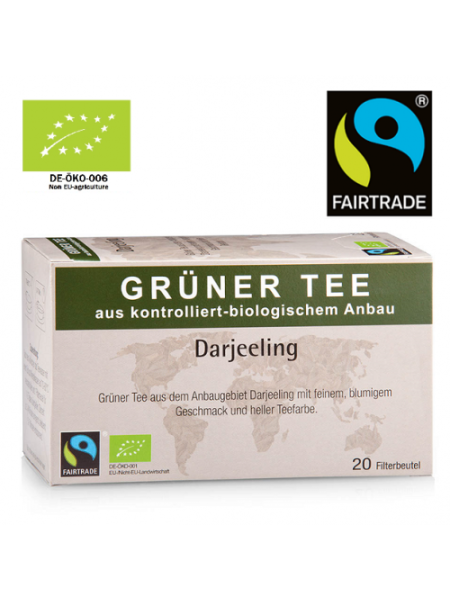
ALOE SHAMPOO - UNIQUE COMPOSITION 100 ml Price 5,90 €
Gently cleanses and cares for hair.
Gives hair a natural shine.
Gives hair a soft, velvety look and plenty of volume.
Protects the scalp from drying out.


The list of beneficial properties of our highest-quality green organic tea is long and below, but it is very important to prepare the tea correctly. Boiling water should not be poured on the tea, it is worth cooling the water to 70-80 degrees Celsius, and if the water quality is even slightly decent, it is not worth letting the water boil completely. Note that green tea is stimulating if you let the tea steep for 3-4 minutes and relaxing if you let the tea steep for 5-7 minutes.
 Delivery
Delivery
Fast delivery all over Estonia
Epigallocatechin gallate (EGCG, EpiGalloCathechin-3-Gallate), which is a flavonoid with antioxidant and anti-inflammatory effects, has a healthy effect. EGCG is only contained in green tea, but not in black tea, where EGCG et al. Catechins are destroyed during the fermentation process.
The protection of green tea against cancer is mainly due to the antioxidants it contains (they bind free radicals and neutralize harmful waste products). Among flavonoids, EGCG is one of the most potent antioxidants, which also activates antioxidant enzymes in the intestines, lungs and liver. The ingredients in green tea also reduce the activity of carcinogenic substances (such as nitrosamines) and strengthen detoxification. Many studies suggest that consuming green tea can reduce the risk of damage to the ovaries, breast, stomach, intestines, lungs, prostate, etc. The risk of cancer, green tea also increases the effect of drugs used in cancer treatment. (1) Catechin is a substance belonging to the group of flavonoids that protects plants from diseases.
Erich Wanker, a German professor of molecular biology, argues that amyloid deposits in the brain play a major role in diseases such as Alzheimer's and Parkinson's disease, and that the EGCG in green tea inhibits amyloid deposition and may even dissolve them. Amyloid is a protein that is deposited into insoluble structures that damage nerve cells in the brain. In such structures, the protein chains are folded differently than usual. Researchers in Berlin have proven through laboratory experiments that the EGCG in green tea binds to an unfolded protein and thus prevents the protein from forming a structure that differs from normal. Instead, rounded formations are formed that are harmless to nerve cells.
If you are interested, read more about green tea on the website of the Estonian Association of Nutritionists: http://www.toitumisnoustajad.ee/retseptid/toiduainete-info/roheline-tee/
Gently cleanses and cares for hair.
Gives hair a natural shine.
Gives hair a soft, velvety look and plenty of volume.
Protects the scalp from drying out.
Vitamin D3 is a necessary vitamin in the autumn-winter period, especially for the sun-poor population of northern Europe. Vitamin D3 supports the immune system, the structure of bones and teeth, as well as the normal functioning of the nervous system and metabolism.
Methylsulfonylmethane (MSM) is a naturally occurring organic sulphur. Plantforce® MSM (methylsulfonylmethane) is not made from petrochemicals like MSM products offered on our market, but is extracted from plant material.
Tzinc is the second most abundant trace element in the human body after iron. There is a high concentration of zinc in the prostate. spermatozoa, the retina of the eye and the skin.
Potent 10:1 extract.
In India, preparations made from the leaves of the sasi-vesikagi (Bacopa Monnieri) (Brahmi in Sanskrit) are used to improve cognitive abilities, memory and learning. Also in the case of improving the nervous system and mental fatigue.
Passionflower (Passiflora incarnata) is a plant that has historically been used in the treatment of anxiety, insomnia, seizures, and hysteria.
Wrinkle-reducing hand cream with a visible smoothing effect. Hyaluronic acid provides elasticity, improves skin structure and smoothes fine as well as light and deeper wrinkles.
Resveratrol is a powerful antioxidant with anti-inflammatory, antitumor and antibacterial properties. Reduces the amount of bad cholesterol, improves liver function and cell metabolism.
Delicious organic salami sausages in a pack of 3 60 g. Produced in Germany.
Vitamin B-6 has many important functions in our body, but one of the most important is its support in the prevention of cardiovascular diseases.
The Jojoba Gold seed oil we offer is a valued oil in face and skin care.
It is a 100% natural, first-time cold-pressed quality oil that does not contain any additives.
Jojoba oil effectively moisturizes and nourishes the skin and helps prevent the formation of wrinkles.
100% pure, organically produced cocoa, 70% of which is probably the best Criollo cocoa bean.
A delicious healthy treat that everyone praises.
100% plant-based, gluten-free, lactose-free, 0% white sugar, ORGANIC.
Made in the EU.
A pleasantly small, quiet, but efficient portable hand fan.
LED display shows the strength level and charge level.
USB rechargeable, both from a computer and with an adapter. Also hands-free, neck-hanging option.
Suitable for home, office, travel. Also an effective computer cooler.
Colors: white, green, pink, blue.
Best quality organic cold-pressed almond oil.
Lots of valuable nutrients and beneficial monounsaturated fatty acids. Good cholesterol regulator.
Good for skin and cooking.

The list of beneficial properties of our highest-quality green organic tea is long and below, but it is very important to prepare the tea correctly. Boiling water should not be poured on the tea, it is worth cooling the water to 70-80 degrees Celsius, and if the water quality is even slightly decent, it is not worth letting the water boil completely. Note that green tea is stimulating if you let the tea steep for 3-4 minutes and relaxing if you let the tea steep for 5-7 minutes.
